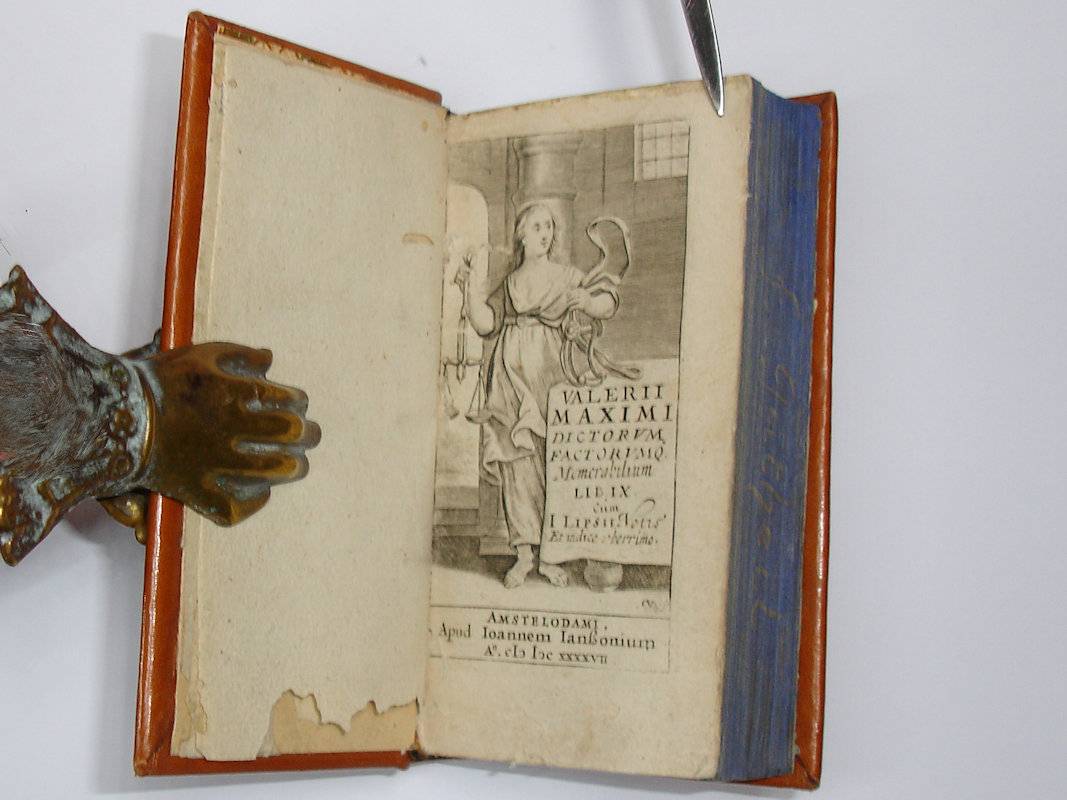VALERIUS MAXIMUS.
Valerii Maximi Dictorum factorum memorabilium lib. IX, cum I. Lipsii notis et indice uberrimo.
Amsterdam (Amstelodami), Apud Ioannem Ianssonium, 1647.
12mo. (XII),486,(26 index) p. Modern calf 14 cm (
Ref: Schweiger 2,1110; Graesse 6/2,245) (
Details: 20th century new binding, antique style. Back with three raised bands. Gilt short title in second compartment. Marbled endpapers. Engraved title: a woman holding in her hands a balance scale and reins. Woodcut initials. Edges of the book-block dyed blue) (
Condition: Back spotted. Title page thumbed. Lower margin of the blank front flyleaf damaged. A few small wormholes in the lower margin of the title page, outside the engraving. Two small wormholes near the gutter of the first 3 leaves, nibling at a few letters) (
Note: The Roman historian Valerius Maximus, who lived during the reign of the emperor Tiberius, composed a manual of illustrative examples for rhetoricians, the
Factorum ac dictorum memorabilium libri IX. 'The subject-matter of the nine books has no clearly defined plan, but is divided under headings, mostly moral or philosophical in character (e.g. Omens, Moderation, Gratitude, Chastity, Cruelty), which are usually illustrated by Roman (domestica) and foreign (externa) examples. (...) The work is shallow, sententious, and bombastic, full of the boldest metaphor and rhetorical artifices of the Silver Age. (...) Yet the variety and convenience of the compilation ensured some measure of success in antiquity, and considerably more in the Middle Ages'. (OCD 2nd ed. 1106) Medieval education drew heavily from classical authors, for pagan learning was necessary for understanding the Scripture. The focus often was on memorizing
sententiae and offering
exempla and anecdotes that exemplified virtues. The critical and historical approach of the Renaissance to the school curriculum eliminated most post-classical authors in favor of 'Cicero for rhetoric, Virgil for poetry, and Caesar, Valerius Maximus or Sallust for history, on the argument that antiquity provided the best models for understanding people and their place in society'. (The Classical Tradition, Cambr. Mass. 2010, p. 294)
§ This edition of 1647 by Johannes Janssonius is a reissue of the Valerius Maximus edition of Leiden publisher Hegerus of 1640. The notes are by the humanist scholar Justus Lipsius, 1547-1606, which were first published by Plantin in 1585. Lipsius consulted for his notes two new manuscripts. Lipsius was probably interested in Valerius Maximus as source for his own
Monita et exempla politica (1605)) (
Provenance: On the front flyleaf the owner's inscription:
J. Piper, Gryphiae 1778. This probably is Johannes Gottfried Piper, a German
Schulmann and paedagogue who studied in Greifswald. Till 1792 he was Rector at Ribnitz, a small city in Mecklenburg-Vorpommern. He died in 1814. (Jöcher, Allgemeines Gelehrten-Lexicon, Bremen 1819, Volume 6, p. 248)
§ On the front flyleaf in ink the name
Groskurd. This is probably the German classical scholar Christoph Gottlieb Groskurd, born 1770, who died in 1834 in Stralsund. 'Ab 1790 studierte er in Göttingen bei den Professoren Gottlieb Jakob Planck, Johann Friedrich Schleusner und Johann Gottfried Eichhorn protestantische Theologie sowie bei den Professoren Christian Gottlob Heyne, Arnold Hermann Ludwig Heeren, Johann Georg Heinrich Feder, Christoph Meiners, Anton August Heinrich Lichtenstein und Splitter (klassische) Philologie. Von 1793 bis 1797 war er Kollaborator am Pädagogium in Ilfeld. Von 1797 bis 1823 unterrichtete er die Tertia am Stralsunder Gymnasium. Er trat 1823 wegen einer schweren Erkrankung in den Ruhestand und widmete sich darauf den Studien der Werke des Strabon'. (Source Wikipedia)
§ On the frontflyleaf also the inscription:
Cunow, in Potsdam. § A former owner, probably the one who had this binding restored, outlined his name in the blue paint at the right edge of the book-block:
F. Gutheil) (
Collation: *6, A-X12, Y4) (Photographs on request)
Book number: 120434 Euro 180.00
Keywords: (Oude Druk), (Rare Books), Latin literature, Valerius Maximus, antike altertum antiquity, römische Literatur
 VALERIUS MAXIMUS.
VALERIUS MAXIMUS.